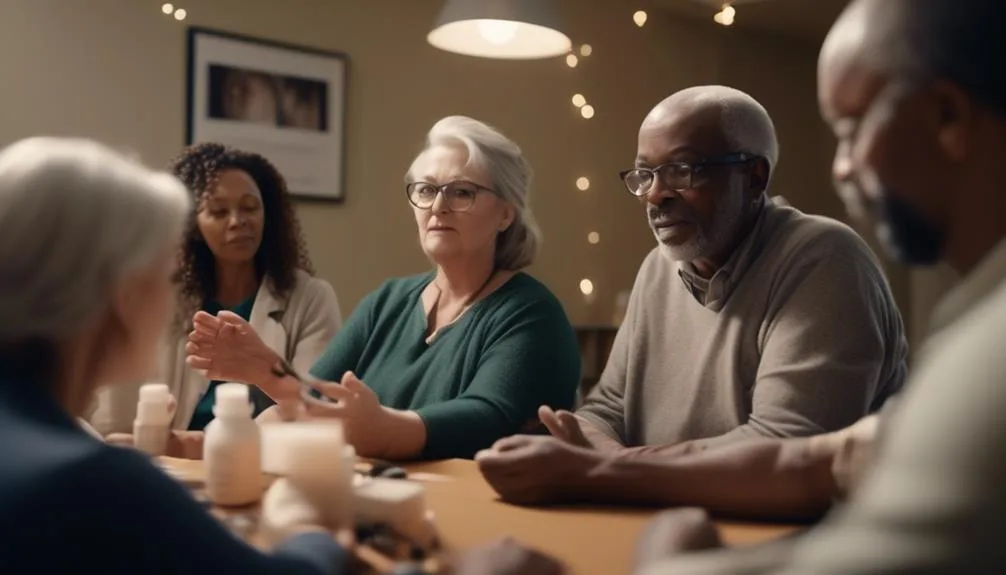Are you tired of feeling like just another patient in the therapy room, with your needs and desires brushed aside? Imagine a therapy approach where you are not only heard, but also empowered to take charge of your own healing.
Picture a therapist who values your experiences and treats you as an equal partner in the therapeutic process. This is exactly what client-centered therapy offers. By placing you at the center of your own therapy, client-centered therapy revolutionizes the traditional therapeutic model and empowers you to heal and grow in ways you never thought possible.
But how does it work? What are the techniques and benefits? And can it really be applied to any mental health issue? In this article, we will explore the fascinating world of client-centered therapy and discover how it can empower you to take control of your own healing journey.
Get ready to embark on a transformative experience where your voice matters and your potential for growth knows no bounds.
Key Takeaways
- Client-Centered Therapy was developed as a response to clinical therapy dominating the field and is a non-directive form of talk therapy.
- The therapy rests on unconditional positive regard, with the therapist refraining from judging the client.
- The approach emphasizes the individual experience of the client and includes the client as an expert in their own experience.
- Client-Centered Therapy aims to facilitate personal growth, eliminate distress, increase self-esteem, and enhance the client's understanding of themselves. It emphasizes empathy, genuineness, and unconditional positive regard.
The Origins of Client-Centered Therapy

Client-Centered Therapy, developed in the 1940s and 50s, emerged as a response to the dominance of clinical therapy in the field, offering a non-directive approach that prioritizes the individual experience of the client and empowers them to take an active role in their own healing.
This revolutionary therapy approach was founded by Carl Rogers, who believed in the power of unconditional positive regard. Through this approach, the therapist refrains from judging the client and instead accepts them without conditions or expectations. This creates a safe and non-judgmental space for the client to explore themselves and gain a deeper understanding of their own experiences.
Core Principles of Client-Centered Therapy

As we explore the core principles of Client-Centered Therapy, we delve into the fundamental beliefs and practices that underpin this empowering approach to healing.
In this therapy, the principles of client autonomy and the therapeutic alliance play a pivotal role in the process of client-centered therapy.
- Client Autonomy:
- Clients are seen as the experts of their own experiences.
- Clients are empowered to make their own decisions and choices.
- Therapeutic Alliance:
- The therapist and client work collaboratively as equals.
- The therapist provides a safe and non-judgmental space for the client to explore their thoughts and feelings.
These core principles emphasize the importance of respecting the client's autonomy and establishing a strong therapeutic alliance. By honoring the client's autonomy and building a trusting alliance, clients are empowered to take an active role in their healing journey and experience personal growth and self-discovery.
Key Techniques in Client-Centered Therapy

The techniques employed in Client-Centered Therapy are designed to create a safe and supportive environment for you to explore your thoughts, emotions, and experiences. One key technique is active listening, where the therapist actively listens and pays attention to what you're saying. This allows them to truly understand your perspective and reflect it back to you.
Another important aspect is the nonjudgmental approach, where the therapist refrains from judging you and accepts you without any biases. This creates a space where you can freely express yourself without fear of criticism or judgment.
Benefits of Client-Centered Therapy

By incorporating active listening and a nonjudgmental approach, Client-Centered Therapy creates a safe and supportive environment for you to explore your thoughts, emotions, and experiences. This therapy approach offers several benefits that can significantly enhance your overall well-being.
Here are some of the key benefits of Client-Centered Therapy:
- Increased self-awareness: Through the reflective listening and empathetic understanding provided by the therapist, you can gain a deeper understanding of yourself, your emotions, and your motivations. This increased self-awareness can lead to personal growth and development.
- Improved communication skills: Client-Centered Therapy emphasizes active listening and nonjudgmental acceptance, which can improve your communication skills both in therapy and in your everyday life. By experiencing a non-judgmental space, you can practice expressing yourself more openly and honestly, leading to improved communication and healthier relationships.
In Client-Centered Therapy, the focus is on your unique needs and experiences, allowing you to explore your inner world and develop a greater sense of self-awareness. The nonjudgmental and empathetic approach of the therapist creates a safe and supportive environment for you to express yourself and improve your communication skills.
Limitations and Considerations

While Client-Centered Therapy offers numerous benefits, it is important to consider its limitations and potential challenges. As with any therapeutic approach, there are ethical concerns and cultural considerations to take into account. It is essential for therapists to navigate these issues with sensitivity and awareness. Ethical concerns may arise when clients are unable to provide informed consent or when their autonomy is compromised. Additionally, cultural considerations play a significant role in therapy, as each client brings their own unique cultural background and experiences. Therapists must be mindful of cultural differences and ensure that the therapy process is respectful and inclusive. By addressing these limitations and considering the ethical and cultural aspects of therapy, therapists can create a safe and supportive space for clients to heal and grow.
| Limitations | Considerations |
|---|---|
| Ethical concerns may arise when clients are unable to provide informed consent or when their autonomy is compromised. | Therapists must navigate ethical concerns with sensitivity and awareness. |
| Cultural considerations are important as each client brings their own unique cultural background and experiences. | Therapists must be mindful of cultural differences and ensure that the therapy process is respectful and inclusive. |
Application and Research of Client-Centered Therapy

To truly understand the impact and effectiveness of client-centered therapy, it's crucial to explore its application in various therapeutic settings and the extensive research supporting its positive outcomes.
- Application Research:
- Client-centered therapy has been widely used in counseling and psychotherapy settings, proving effective in treating various mental health issues.
- It can be adapted for different populations and age groups and integrates well with other therapeutic approaches.
- Effectiveness Outcomes:
- Numerous studies support the effectiveness of client-centered therapy, particularly in treating depression, anxiety, and relationship issues.
- Clients consistently report high levels of satisfaction with this approach, and long-term positive outcomes have been observed.
Through research and application, client-centered therapy has proven to be a valuable and respected therapeutic approach, empowering clients to heal and improve their overall well-being. Its adaptability and positive outcomes make it a versatile and effective choice for individuals seeking therapy.
Frequently Asked Questions
How Does Client-Centered Therapy Differ From Other Therapy Approaches?
Client-centered therapy, also known as person-centered therapy, differs from other approaches by prioritizing the client's experience and empowering them to lead the therapy process. It emphasizes empathy, non-judgment, and creating a safe space for self-exploration and growth.
What Is the Role of the Therapist in Client-Centered Therapy?
In client-centered therapy, the therapist plays a vital role in creating a safe and empathetic environment. They listen actively, reflect back your thoughts and feelings, and provide unconditional positive regard, allowing you to explore and heal.
Can Client-Centered Therapy Be Effective for Individuals With Severe Mental Health Conditions?
Client-centered therapy can be effective for individuals with severe mental health conditions, but it has its limitations. It relies on the client's ability to express themselves and requires a skilled and empathetic therapist. Progress may be slower compared to more directive therapies.
How Does Client-Centered Therapy Promote Personal Growth and Development?
Client-centered therapy promotes personal growth and development by promoting self-discovery and empowering individuals. It provides a safe and non-judgmental space for clients to explore their thoughts, feelings, and experiences, ultimately leading to increased self-awareness and a sense of empowerment.
Are There Any Specific Populations or Age Groups That Client-Centered Therapy Is Particularly Effective For?
Specific populations and age groups that client-centered therapy is particularly effective for include individuals seeking personal growth and development, those experiencing mild to moderate mental health conditions, and people of all ages who desire a safe and non-judgmental space to explore their experiences.
Conclusion
Congratulations on taking the first step towards reclaiming your power and embarking on a transformative healing journey.
In client-centered therapy, you're the driver of your own healing, with a therapist by your side as a supportive guide.
Together, you'll explore the depths of your experiences, uncovering hidden strengths and unlocking your true potential.
Imagine yourself as a soaring bird, breaking free from the chains of traditional therapy, and embracing a new era of empowerment and self-discovery.
The future of healing is in your hands.

